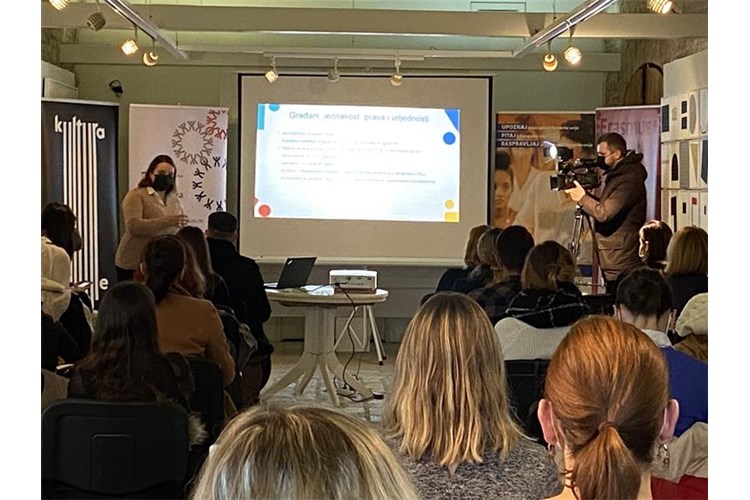On 23 November 2021
, at the Ružić Gallery in Slavonski Brod, the Government Office for Cooperation with NGOs (GOfNGOs), Crative Europe Desk at the Ministry of Culture and Media and the Agency for Mobility and EU programmes presented funding opportunities for the nonprofit and public sector through Union programmes.
Creative Europe - sub-program Culture, Citizens, Equality, Rights and Values (CERV) and ERASMUS + programme.
Joint event of the GOfNGOs, the Creative Europe Desk at the Ministry of Culture and Madia and the Agency for Mobility and EU Programmes has attracted a great interest of the representatives of different non-profit organisations form the Brod-Posavina County which, in the light of the current epidemiological measures, filled in all the places at the Ružićka Gallery.
The participants were welcomed by the
Deputy Mayor, Marina Martić-Puača, who expressed satisfaction with the possibbility of exchanging valuable information that will facilitate the non-profit and public sector to better prepare projects in the new financial period. The participants were briefly greeted by the coorganisers of the event,
the director of the Slavonski Brod Art Gallery, Romana Tekić and Maja Kuzmić, the representative of the EU Europe Direct Slavonski Brod, EC Contact Point for informing on EU activities and funds.
Attendees then listened with interest to the presentations of these Union programmes aimed at the non-profit sector.
Željka Markulin from the GOfNGOs, the CERV Programme Contact Point in Croatia, explained the new, centralized
CERV programme covers the areas of the former Europe for Citihzens, Rights, Equality and Citizenship and DAPHNE programmes. It is committed to building a more democratic Europe and raising citizens' awareness of the Union's rights and values through financial support for the non-profit and public sector. The estimated budget of the CERV programme in the financial period 2021-2027 shall be EUR 1,5 billion, to be divided into 4 thematic sections: 1) The Value of the Union; 2) Equality, Rights and Gender Equality; 3) Inclusion and Participation of Citizens; 4) DAPHNE – fight against all forms of violence. As a Contact Point of the CERV programme, the GOfNGOs is reposnsible for informing and educating about the Programme, strengthening its visibility in the Republic of Croatia and providing technical support to applicants and project beneficiaries.
Morana Bigač Leš from the Creative Europe Desk – Culture Office presented the Creative Europe programme, the only Union Mechanisme to support cultural and creative secgtor. The Creative Europe covers sub-programmes of Culture, MEDIA and cross-sectoral sub-programme, i.e. its
Culture sub-programme comprehending all cultural and creative sectors (except for audio-visual and film). The Creative Europe programme was created in 2014 by merging two programmes, Culture and MEDIA. In the new programming period, with a 50% higher budget, Creative Europe invests in activities that strengthen cultural diversity, contribute to recovery and respond to the needs and challenges of cultural and creative secgtors, helping them become more digital, greener, more resilient and more inclusive.
Marija Pavlović Bolf from the Agencyay for Mobility and EU programmes presented Erasmus+, the European Union largest programme for education, training, youth and sports, which enables all generations – from kindergarten to old age to acquire new knowledge, experience and skills. With the increased budget the new programme Erasmus+ seeks to adapt to global challenges through the key priorities: inclusiveness, digital transformation, and green and participatory priority. The Programme offers opportunities for periods of study abroad, internships, training and exchange of staff in all areas of formal and non-formal education, training, youth and sport, as well as cooperation with related organisations on international projects. As one of the Programmes goals is to improve the quality of adult education throughout Europe, Ms Pavlović Bolf introduced attendees with the possibilities of participating of organisations active in the field of (non-professional) adult education in decentralised activities of the Programme.
Finally, the interested asked the presenters questions and got concrete answers including brief instructions on how to best shape their project ideas.
The event was organised in cooperation with the European Commission Contact Point for informing on EU activities and funds EU Europe Direct Slavonski Brod.

Page


